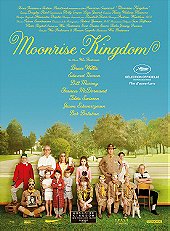Whether or not you’ll engage with Moonrise Kingdom will be easily discerned whtin the opening minutes as it’s a free association of Wes Anderson’s numerous quirks and obsessions. We explore a familial home and the complicated relationship therein by viewing everything as if it were a series of elaborate tableaux in an immaculate dollhouse. Personally, Anderson’s brand of formal rigidity and emotional melancholy has always mesmerized me, and Moonrise Kingdom was no exception.
The candy-colored bric-a-brac of the home is viewed as though it were a series of comic book panels, and it does quick work establishing not only interpersonal dynamics but a mood of emotional turmoil and confusion. We eventually focus on Suzy (Kara Hayward), the preteen daughter that’s clearly a type of Anderson protagonist: intelligent, emotionally troubled, and preternaturally talented. Anderson’s work is populated seemingly entirely by characters like Suzy, or like her love interest, Sam (Jared Gilman). Sam is an expert in one area but green to crafting interpersonal relationships.
Moonrise Kingdom zeroes in their first love, from meet-cute to courtship, from escape from wider society to forced return to their small coastal village. Anderson’s delicate touch finally gets around towards tackling a story of first love, and it’s an absolute delight. Granted, it can flirt with too much with overdosing on Anderson’s formalism and perfect symmetry, with dainty quirkiness and obsessive minimalism. That is to say, Moonrise Kingdom may occasionally flirt with becoming self-parody.
Yet Moonrise Kingdom is just so damn earnest in the best of ways, best exemplified by Edward Norton’s scout leader. There’s a loneliness and eagerness to him that’s trying to do what’s best as he believes it will help the troop grow into good men. Norton’s performance is so wonderfully rich and vibrant, and it’s a reminder of how good he can be when he forsakes sweaty Method intensity for more abstract and colorful performing styles.
Everything great about Moonrise Kingdom rests upon his character and performance. Ostensibly a villain in any other film about childhood dreamers trying to build a world of their own, here he’s granted the same amount of generosity and empathy as everyone else. He eventually reveals himself as someone that wants to do what’s right and make everything work out successfully, even if his methodology is occasionally rigid or the sight of a round peg/square hole.
This leads into another rabbit hole of Moonrise Kingdom’s outlook: it’s nesting doll of love stories where the players inelegantly express their wants, desires, and needs. While most of the story orbits around Sam and Suzy, their parents, caretakers, and adults in the periphery are drawn into their central relationship and secrets are exposed. Anderson’s characters are often lonely and seeking connection and understanding, and Moonrise Kingdom positions the innocence of first love in contrast with parental dysfunction, orphans (both literal and figurative) finding each other, and caretakers providing strident if well intentioned affection.
Much like his artistic forebearer Jacques Demy, Anderson’s style is inimitable because it’s not just his series of fetishes cobbled together, but the ways in which he does it. And much like Demy, his best films offset the candy-colored visuals with a profound sense of sadness and longing. They’re both dreamers who express sentimentality as often as they excise it, and Moonrise Kingdom is a solid vision from one of American cinema’s current geniuses.
 Login
Login